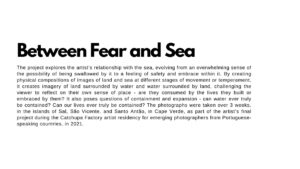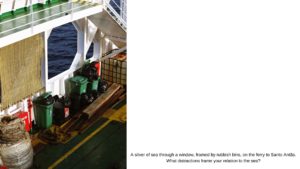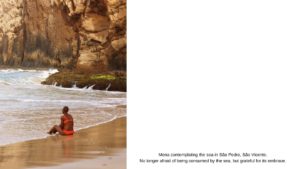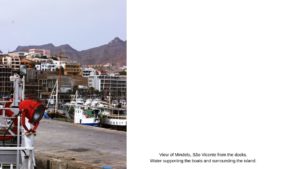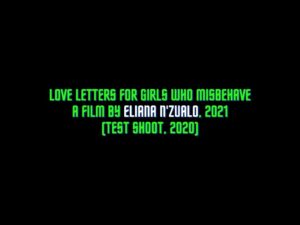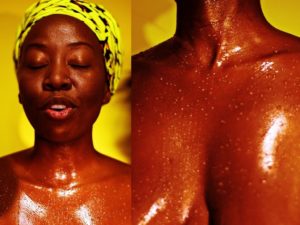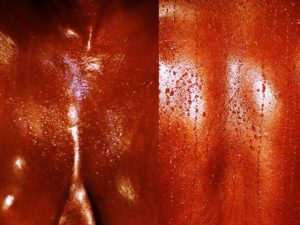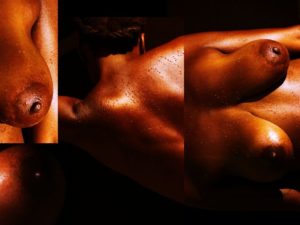Artist (she/her, b. 1992) based in Maputo, Mozambique, working primarily through writing, photography, and film.
0

Filomena Mairosse
Maputo, Mozambique
Between Fear and Sea (Photography, Photo Installation, Catchupa Factory 2021)
Love Letters for Girls Who Misbehave (Photography, Photo Collage, Test Shoot, 2020)
All good things must end sometime.
Sunset
Yesterday’s sunset reminded me of how beautiful endings can be. I don’t quite know if I can call the endings I’m experiencing at the moment beautiful, but I’ve been thinking a lot about what they mean. A lot of the time, what comes to mind is how I could have used my time here better, the dinner parties I was afraid to have because I didn’t have chairs, or the brunches I never hosted because I’ve always dreamed of hanging out in my kitchen with friends, but my kitchen didn’t have counters (it still doesn’t). I think about how I never prioritized hanging up the art I’ve collected over the years because what use would it be to decorate the walls when the house was so bare? Sitting here, watching the sunset, I thought about how I’m not going to have this view anymore and how I wish I’d had friends over more often to watch it with me.
Nuno
I think about endings a lot, how every day presents an ending without fail, and without fail a new day will begin. Someone I didn’t know passed away, and I was woken up by the sound of the motorcade procession in honour of his homegoing. There were videos and posts from the people who got to meet him, and one thing struck me as I was watching all of this happen, which was how loved this man was. To be the kind of person who impacts others’ lives like that feels magical to me. To see so many stories of how good of a human someone was and how missed they’ll be feels reflective of a sort of universal truth or collective mission or purpose of existing: to be a good person. I think a lot about death and this big ending as a reflection of the lives we’ve lived, and I guess what I’m trying to say is I hope all of us get to be loved and missed by the people who we cross paths with while we’re here.
Eloise
It’s raining now. Not the kind of rain that’s beautiful and cleansing, but the kind that convinces you that nature is indeed angry at us. We’ve been dealing with hurricanes and tropical storms the last few years at a rate that feels like punishment for sins we didn’t personally commit, but had to be paid for with blood. Someone’s blood, anyone’s blood. I don’t quite have the words to describe this yet, but it feels like another one of those big endings. I just don’t know how big or what exactly is supposed to be ending.
I hope I stick around long enough to find out.
[originally published on January 24th, 2021, on https://menamairosse.medium.com/all-good-things-must-end-sometime-c4571b6e684b]
Things (Still) Fall Apart
I like stability. I like consistency and predictability in my environment, and sudden changes always throw me off for longer than I’d like.
This entire year feels like it’s been one big sudden change or a rapid succession of infinite sudden changes. It’s been hard to keep sane. It’s not that I’m not adaptable either, we all are to some degree, but it takes me a really long time to get out of the cycle of sadness and frustration at the unfairness of having to change yet again when I was just getting used to what was. It’s jolting to be asked to do so as many times as we’ve all had to this year.
How do you celebrate the good things while mourning the destruction around you? How do you hold space for the little joys that make life worth living, and for the insurmountable sadness of watching people die around you? How do you comfort yourself while comforting others?
And the thing is, all the things that broke down this year seem so much more visible than whatever we might have gained, whatever I might have gained. All I can see is the record brokenness my bank accounts experienced, the health issues, the relationships I lost and might still be losing, the tech issues with every single device I own (as I type this, my credelec machine broke — yes, those break too — and I’m waiting for the customer service lines to open up, so I can call them, that is if my phone battery holds on long enough), the consistent underlying depression I’ve been in this entire year, the overwhelming weight of being a woman that was highlighted by all the rape and killings of women we saw this year, from realizing women have no one else to count on but each other and even that’s not guaranteed, the heartbreak of knowing there’s a war going on in Pemba and the government doesn’t give a shit, leaving us to draft up disjointed attempts to patch a bleeding wound.
It’s taking much more effort to remember that I learned how to compost, that I managed to keep cuttings of a dying plant alive for a few months (yes, me, the notorious plant killer kept plants alive!), that I’ve reintroduced meat into my diet, and I’m having the best relationship with food I’ve ever had, that I’m starting to like my physical body, like really, really like it, not the fake liking I’d been doing years before because I’m skinny and therefore should not have any issues with my body according to social convention. It’s taking a lot more effort to remember that my relationship with my parents has improved tremendously, that I have a little niece who I love to pieces and looks just like me, that I have a couple of friends who have truly taken this year and made it their bitch and who I’m incredibly proud of.
It’s taking much more effort than we thought it would to just exist and although well-intentioned, the idea that we just have to hold on a little longer because the year is almost over doesn’t really comfort those of us who are painfully aware that time is a social construct and January 1st, 2021 won’t magically erase 2020 and reset the lock.
_
I thought this would end on a positive note, but I don’t quite know how to do that anymore. Maybe I’ve lost the skill. Maybe, through writing again, I’m trying to relearn it. Who knows.
[originally published on November 11th, 2020, on https://menamairosse.medium.com/things-stilll-fall-apart-cc6f40628c1]
Performative Adulthood
Reflections on adulting and how we define it
What is an Adult?
Wikipedia states:
“Biologically, an adult is a human or other organism that has reached sexual maturity. In human context, the term adult additionally has meanings associated with social and legal concepts. In contrast to a “minor”, a legal adult is a person who has attained the age of majority and is therefore regarded as independent, self-sufficient, and responsible.”
Independent, self-sufficient, and responsible. Each term a loaded one, plagued by environmental, social, economic, and cultural expectations particular to each of us.
Is “Adulthood”, then, simply the age when we expect to have it all ‘together’ (whatever that means)? Is it the age of panic, when the crippling realization that our peers (and those who came after them) already have it all figured out sets in? Is it the moment when we realize there’s them – the adults – and us – the failures, the incapable, the underperforming? Or is it just the point at which we’re made aware that the world is disappointed in us, and we, in turn, become disappointed in ourselves?
(Dis)Comfort in Precedent
“Is the job I have good enough?”, “Have I found ‘the one’?”, “Am I honouring my parents?”, “What type of parent will I be?”, “Am I capable of sustaining myself?”, “Have I achieved enough?”, “How much achievement is enough?”, “Shouldn’t I have done these things already?”, “Am I too old for this?”, are just a scratch on the surface of the questions that drown us. A string of dense, heavy, suffocating questions that usually come around birthdays and new years and other symbols we’ve dreamt up to measure the passing of time.
Amazingly enough, throughout the many iterations of the human experience, these same questions have been asked, answered, and disregarded time after time. Since the dawn of time itself we have agonized over these measures of validating our existence and have documented our answers in books, and music, and theatre, and photography, and film, and YouTube videos and yet, as though it were a twisted rite of passage, we each choose to go through the pain, uncertainty, dread, and despair in search of those same answers in our own lives.
Maybe, asking these questions century after century is the unifying umbilical cord connecting us to past generations. Maybe, just maybe, humans are connected not by a string of shared experiences but by shared uncertainties.
We punish ourselves by comparing our achievements, or lack thereof, to those of our predecessors – parents, idols, the historical outliers. We impose on ourselves the same standards of human validation as people who lived in a different time, economy, society; we compare ourselves to standards that feebly apply to what we face today and expect our adulthood to look like theirs. Granted, the ones who came before us are the only references we have but in regard to what it means to be a fully realized human, the victories of yesterday should not be replicated word for word but reimagined through the lens of today.
To have a wife and kids and an office job to support you was a valid measure of successful adulting when simply living as an independent being in an independent country was achievement enough. To think about sexual identity and taking pleasure in our work and being sustained by the crafts that bring us joy were foolish preoccupations in times past, but these are the challenges of today and so, what we uphold as measures of achievement, maturity, adulthood, deserve to be redefined.
Liberation
There’s so much pressure to be, do, or appear as these pre-defined moulds of a functioning adult that it stifles us from fully becoming any of the infinite possibilities available to us if we look outside the moulds. To perform adulthood is counterproductive to actually becoming the most fully actualized versions of ourselves.
Performative adulthood implies that we at least try not to be seen slacking or lagging behind when around “real adults” (whoever they are). And so, we go about pretending to have our lives under control, to be living them unhindered and unfazed. What this leads to is a feeling of fear, of awkwardness, of not fitting in, of not doing things right, of not being enough – as if there was one correct and universal standard of how to “adult” – the shame around failing at adulthood preventing us from ever expressing doubt, asking questions or asking for help; because in performance, it is cardinal sin to admit you don’t know.
Since for so many of us, life isn’t where we thought it would be – a realization that seems to be true at every stage -, maybe it’s part of the human condition, at this particular level of consciousness, to be constantly dissatisfied with where we are and what we’ve achieved, and perhaps the solution isn’t to do away with the dissatisfaction and uncertainty but to learn to function with them.
Many have found comfort in releasing the need to justify their life’s unfolding to anyone other than themselves, and there seems to be value in this. People try to make sense of each other in a feeble attempt to distract themselves from looking inward at their own wounds and shortcomings. It is scary and daunting to look inside ourselves and nurse back to health the parts of us we were taught to think of as broken, and unworthy, and not capable, and not enough. But once we do take that step, we start realizing nobody else is here to make sense to us and that we, in turn, are under no obligation to make sense to anyone else as well.
A Daring Resolution
If we consider that uncertainty is a shared struggle, then it’s safe to assume that nobody knows what they’re doing. If that is what unifies us as a species, the fact that generation after generation of living and existing and facing the same basic human themes – love, family, friendship, survival, parenthood – over and over again, it might be time to embrace the possibility that there’s no universal formula for adulthood.
So choosing to live a life of continuous experimenting in lieu of a performative ideal of perfection, a life of trying and failing and failing and trying and doing and doing and learning through active engagement with this human experience, seems like the closest thing to adulting one can do.
[Published on: menamena.co – jan 14th, 2018]
Healing Wounds
What you are about to read is a person’s inner reflection of a lived experience, with commentary from the subject’s imaginary narrator.
To Bring Out, To Make Known
I’ve been feeling very resentful lately. Resenting things I wanted and now have for keeping me from other things I wanted but now can’t have. One can only do so much in a day.
I’ve been feeling exhausted, burnt out, lethargic, uninspired, angry, impatient, reactive. I don’t like the person I’m becoming. The more I think about it, the more I blame myself, which is also not useful. I blame myself for not prioritizing, for not having enough willpower to push through or commit to things (and for over-committing too). I know it can’t just be that I’m a bad human who’s failing at life. It can’t always be my fault, and I shouldn’t be talking to myself this way. I need to start treating myself better and having more patience with myself.
surface (noun)
1. the outside part or uppermost layer of something.
2. (geometry) a continuous set of points that has length and breadth but no thickness.
Symptoms are merely a reflection of cause. They manifest on the surface, while cause exists at the root. The surface, where symptoms live, is loud and visible and aggressive; the root, where cause lives, is quiet and hidden and controlled. It’s no wonder we pay attention to one more than the other, despite both calling out for our attention, although in very different ways.
The Base, The Foundation
My issues with consistency seem to have nothing to do with willpower or anything as “surface-level” as that, although we don’t think about willpower as being a surface-level thing. They have a lot to do with beliefs about myself, my worth, my value. I realized that the reason I couldn’t commit to this was because I felt like whatever idea I had was less worthy than the validation that came from working with people I admired, people I thought of as “above me”, either by intelligence or talent or “coolness”. I thought that whatever came from them validated my talents and therefore should come before all else in my life, including the things most important to me.
It’s a funny thing how we let exterior validation hold more weight than our own wants and needs. When something external touches on a deeply rooted insecurity, it becomes very easy to shift our focus and attention to the external validation and forget the things that require no validation at all. Unhealed wounds are like magnets to our internal compass, they take us off our path.
root (noun)
- the part of a plant which attaches it to the ground or to a support, typically underground, conveying water and nourishment to the rest of the plant via numerous branches and fibers.
2. the basic cause, source, or origin of something.
In recent times, there has been an increasing conversation about looking beyond the surface and getting to the root of things. We’ve started realizing that how we react – resentment, exhaustion, anger, uninspiredness, etc. – are surface reflections of deeply rooted beliefs, and that those beliefs are brought to the surface by engaging with the world. Paying attention to what’s happening on the surface can be a great roadmap to uncovering what the real issue is. When we find ourselves in the same place of dissatisfaction over and over again, it’s important to ask “is there more to this?” And most times, there is.
If we believe we are unintelligent, we will be drawn to things and people that make us feel intelligent. And although this might not seem like an issue, it still doesn’t address our innermost belief: that we are not intelligent. A healed internal belief would manifest itself as a strong sense of self and a reduced need or attraction to situations that validate us. Validation would no longer be needed.
If you have personal projects you never get off the ground, the misconception is that you lack willpower or focus or that you don’t “really” want what you say you want. But what if the real reason is that you hold some “less than useful” beliefs about yourself – that you’re not talented enough, that nobody cares about you or what you do, etc. – and you get distracted by activities that soothe the pain that comes from those beliefs? Unaddressed self-beliefs make us easily susceptible to things that distract us from what we really want to do.
To Mend, Fix, or Make Whole
I guess this is why we need each other, right? To mirror the deep-rooted wounds or gifts we’ve suppressed so that we can heal or remember them. It’s also funny how our outer shells, our egos, these beautiful, useful, built-in protection mechanisms can make it seem like we have no wounds to heal or can conceal the gifts we feel the world will misunderstand, to a point where even we forget that we have them.
The ego inspires us to speak louder to defend our ideas (sometimes, to the point where we can’t hear what others are saying) so that we don’t have to deal with the pain of feeling unseen or unheard. It creates a larger-than-life personality to shield us from the pain of feeling small and insignificant. It creates reasons to justify us not pursuing our passions so that we don’t crumble under the realization that we might have made the wrong decision. The ego is useful. It’s working for us, not against us. It’s like that caring parent whose methods don’t always seem so caring until we take the time to stop and observe them with empathy and care.
To have empathy, compassion, and patience for ourselves takes a type of strength and courage most of us weren’t taught to have. It’s hard to acknowledge that we felt a way about ourselves that was less than caring, to forgive ourselves for those feelings, and to nurture and send love to the parts of us we left unattended for so long. Funny how we were taught to do all of these things toward others and never taught to do them toward ourselves.
heal (verb)
1. cause (a wound, injury, or person) to become sound or healthy again.
2. become sound or healthy again.
3. alleviate (a person’s distress or anguish).
This is a time to rethink our relationship with ourselves. What deeply rooted self-beliefs need healing? Which parts of ourselves do we need to send love to? Have we told ourselves, “I love you” today? Have we thanked our egos for all that they’ve done for us lately? Have we told them (and shown them) that we don’t need their protection anymore and that it’s OK for them to let us go? Maybe we should.
An Affirmation
Someone tugged at a wound of mine and by looking beyond the surface – my resentment, my anger, my uninspiredness, my fatigue, my reactiveness – and understanding the underlying belief and the pain it was causing me, I began to heal. I refuse to accept pain as my natural state and also to let my ego disguise it. I choose a life filled with joy and bliss and ecstasy. Pain can come and visit, but it cannot make a home here. I choose to look at my wounds and forgive myself for the feelings I harboured toward myself. I’m sending love to those wounded areas and healing them with compassion, empathy, and time.
Every day I wake up and tell myself,
“I am healing.
I am healing.
I am healing.”
[Published on: menamena.co – feb 18th, 2018]
